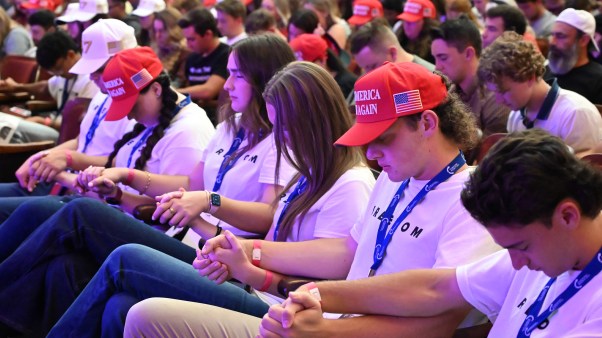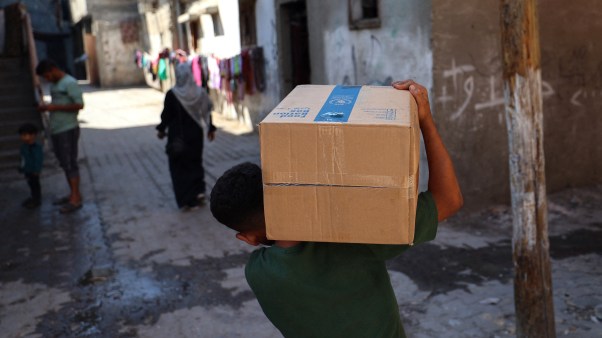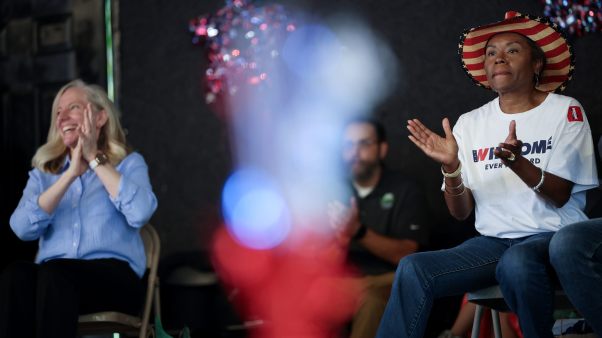Houses After the Hurricane
In the wake of Hurricane Andrew, the Mennonite Church of Homestead, Florida, wanted to help the poor of Dade County move out of the suddenly crowded apartments and tenements. The church discovered that the U.S. Department of Housing and Urban Development had the funding to make it happen. But how could a church use government funds?
The church established a separate, non-profit Community Development Company (CDC), that, while led by church members, has access to government funds and block grants.
Since 1992 the “Nehemiah Project” has built or rebuilt 53 homes, which are sold to low-income families at appraised (not market) value. The CDC also uses the funds to help offset the new owners’ mortgages and teach classes (on topics such as credit and equity management) that will help the new owners keep their homes.
—Drew Zahn
The Serving Bowl
Steve Sjogren tried the traditional methods of evangelism when he planted Vineyard Community Church in Cincinnati, Ohio. But after 18 months, only 37 people attended. Then Sjogren returned to the Gospels and saw that Jesus served everywhere he went. Then the 37 went into their community to serve, including scouring the restrooms at local bars while disbelieving employees looked on.
Eighteen years later, the church has an attendance of 6,000.
Today, two hours every Saturday are set aside for “Serve Fest.” Members gather at the church, choose their assignments, then scatter to clean toilets, rake leaves, give sandwiches to homeless people, and take their dogs to nursing homes to cheer elderly residents. Then they return to the church to swap stories and pray over the seeds they’ve planted.
“One man came a year and a half after someone handed him a water bottle on a bike trail,” says Mary Secrist, Sjogren’s assistant. “Now he and his wife are involved and serving.”
Visit www.servantevangelism.com for more ideas.
—Eric Reed
Montana medical ministry
The Glacier National Park area in Montana is beautiful, but tourist and construction industries tend to be seasonal, and 30 percent of the residents of Flathead County are without medical insurance.
Christ Lutheran Church in Whitefish responded. In 1994 Jay Erickson, a physician, and his wife, Meg, a registered nurse, joined other parishioners to establish the Shepherd’s Hand Clinic, transforming the church into a volunteer-staffed medical facility one night a week.
Each year they see from 800 to 1,200 patients. Patients fill out a brief form that includes a box to check if they would like spiritual counsel. Starting at 6:00 p.m. the clinic stays open until urgent needs are met.
“I’ve seen them wait three hours,” said Angela LaRoque, “but the doctors and staff are incredible” She, with her husband, a self-employed builder, and their three children were seated recently among 25 other patients around tables in the reception area. The LaRoques were all suffering with pink eye, which was currently epidemic at the local elementary school.
“An office visit with a local doctor runs about $60,” said LaRoque. “It would cost $300 for us without prescriptions. We’d have to take out a loan or something. This is really a blessing.”
—Millie Norwich
Refugees in Iowa
As Des Moines’ Hispanic population grew, a Spanish teacher from Westchester Evangelical Free Church felt called to teach an English-as-a-second-language (ESL) class. Her first class had five students. As word spread, she welcomed dozens. Only they weren’t Spanish-speakers—most were Bosnian refugees.
Then the volunteer-staffed ESL ministry began supplying the refugees with used furniture and clothing, helped them understand mail and keep doctor’s appointments, all while teaching the English language. Five years later, nearly 150 are learning English at Westchester EFC, using phonics programs based on Bible stories, and for level two students, the Book of Mark.
“When I was first recruited,” says current co-director Edith Mekkes, “I was told, ‘If you can speak English, you can teach it.’ At first I thought, Oh, sure, but I’ve seen it’s true. The people are so eager to learn. We now have volunteer teachers from several churches.”
Through the class, many Muslim Bosnians have found a home and a Savior. And this Iowa church has found a heart for inter-cultural ministry. “There are between 8,000 and 10,000 Bosnians in Des Moines,” Mekkes says. “Now we’re praying for a Bosnian pastor.”
—Drew Zahn
School Supplies Carnival
Some 60 churches around Tacoma, Washington, have turned a school-year ritual into an outreach to needy children and schools, a cross between a block party and state fair, where prizes include a new box of 64 crayons.
It started when Mark Kramer, pastor of Trinity Church, and the church’s secretary wondered how to help the children, many of them from lower-income families, who attended the school across the street. They created the School Supplies Carnival, a Saturday in August where kids play games and earn points to “purchase” donated school supplies.
Diane Brown, social worker at Spanaway Elementary School, explains, “We’d spend several weeks looking for supplies for kids who didn’t have any. Sometimes those kids wouldn’t start school because their parents would want to have supplies first.”
During the summer participating congregations collect new pencils, notebooks, and crayons. Retailers supply backpacks and lunch boxes. At the carnival, in addition to the games, music, and food, police and firefighters give demonstrations, and the local health department provides free immunizations.
“Because of the relationship built between the churches and the schools,” Kramer says, “when the schools are in need, they often turn to the churches that have been involved.”
The Faith Partnership of Greater Tacoma has produced a short videotape and booklet explaining the carnivals. “It’s the type of thing that’s reproducible in any community, large or small,” Kramer says. For more information, e-mail pcf7@juno.com
—Eric Reed
Copyright © 2003 by the author or Christianity Today/Leadership Journal. Click here for reprint information onLeadership Journal.









